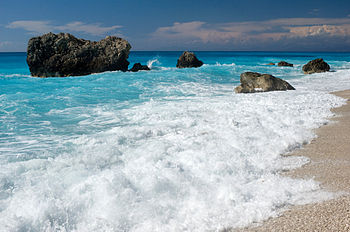Lorenzo and Marco and Matteo are stylish. How ’bout this ends-in-o choice for a son?
Thanks to Rebecca for suggesting Lafcadio as our Baby Name of the Day.
Lafcadio: Starting with Greece
Here’s the thing: Lafcadio only sounds Italian. Maybe Spanish. Or maybe like the word laughter.
But it’s none of those things.
Lafcadio is a place name, from the Greek island of Lefkada – that’s one of the island’s lovely beaches in the picture above. Lefkada is also the name of the island’s main city.
The island’s name could come from lefko – white in Greek, as in the color of white rocks on the cape, or the white pebbles on its beaches.
The island is connected to Odysseus – some say that his palace is here.
The poet Sappho may have committed suicide on the island, diving from the cliffs.
Other myths connect Aphrodite to Lefkada, and it remains a romantic destination in the Ionian Sea.
Lafcadio: The Writer’s Story
The Greek island had been ruled by the Venetians and the Ottomans, but in 1850, it was under British control.
Irish-born Surgeon-Major Charles Hearn was stationed there. He’d married a well-born local girl, Rosa Kassimati, and they had two sons: George, who died young. Then came Patrick, who was baptized Patricios Lefacadios Hearn in the Greek Orthodox Church.
Dr. and Mrs. Hearn did not live happily ever after. When the military doctor was promoted and re-assigned to the British West Indies, he packed his wife and son off to live in Dublin. It was a disaster – Rosa spoke no English, and his family disapproved.
Patrick was raised by his Aunt Sarah, who made sure he was educated. Then the money ran out, and at nineteen, young Patrick set off for the United States, where he became a writer for the Cincinnati Daily Enquirer.
Writing took him to New Orleans and the West Indies.
He’s been described as a “wayward bohemian genius,” and indeed, his life was one of adventure and unconventional choices.
As a writer, Lafcadio was the name he used – part-penname, part-legacy of his birth.
In 1890, he went to Japan as a newspaper correspondent. The newspaper gig didn’t last, but Lafcadio fell in love with the country. He became a naturalized citizen, married the daughter of a samurai, and adopted the name Koizumi Yakumo. He wrote more than a dozen books on the country, and they became his most successful works.
Lafcadio: A True Rarity
All of this makes Lafcadio quite literary and rather fascinating.
But no one is actually giving this name to their sons. US Census records list fewer than a half dozen, and some of those are in the middle spot.
Lafcadio would be perfect in the middle spot, a great place for a daring name.
Then again, Lafcadio could shorten to Cade, transforming a globe-trotting, literary rarity to an every-boy name with a touch of the Wild West.
Lafcadio is likely to remain rare. But should you need a Greek-Japanese-Irish heritage choice, I dare you to do better.
What do you think of Lafcadio? Is this one wearable as a given name in 2014?









What is great about this name is that the first time you hear it, it sounds like names like Lysander, Theophilus and other long, antiquated names with a rich history and then you find out only one person wore it and it actually was a stylisation of an invented name derived from the name of an island (if I understood everything correctly). I love it. I would not use it for my children so I’m gonna give it to another type of children: a character in a story I’m writing.
I remember reading some Japanese ghost stories by Lafcadio Hearn as a teenager, and being fascinated by his life story and name (which the book took the trouble to explain, so I guess the editor was fascinated as well).
It’s definitely one of those once-in-a-lifetime names, and maybe wouldn’t be automatically connected to the author by most people.